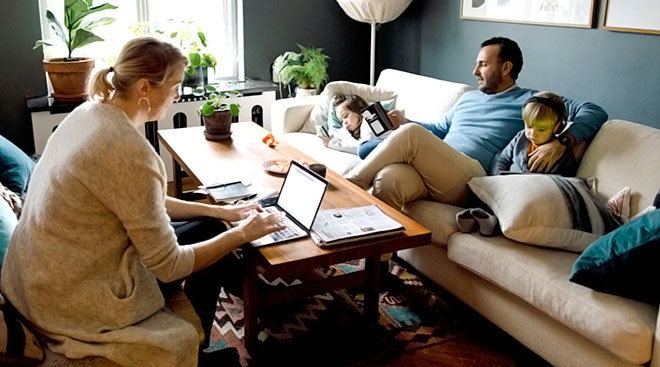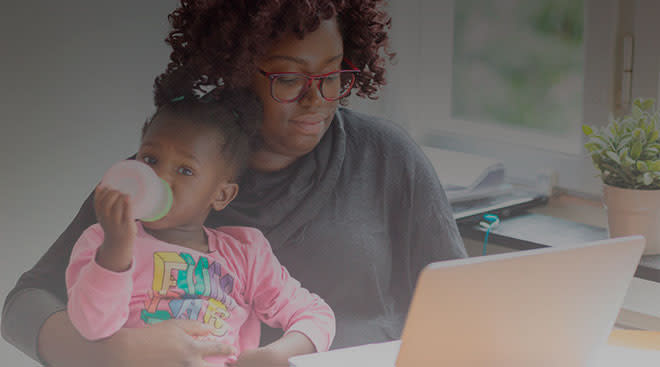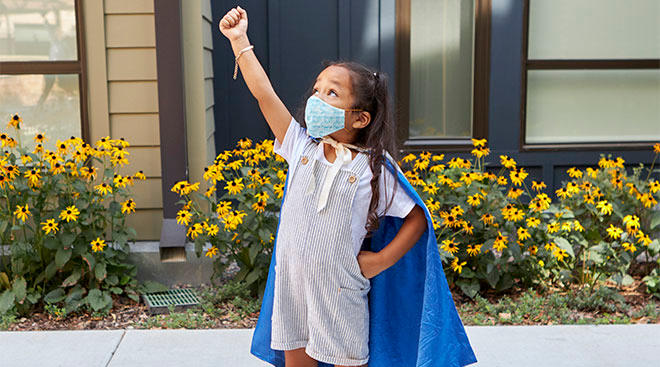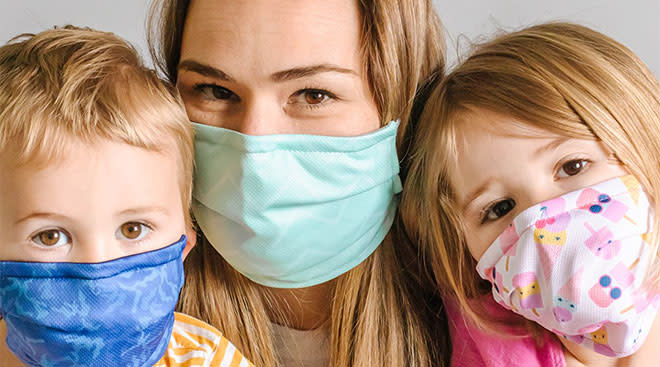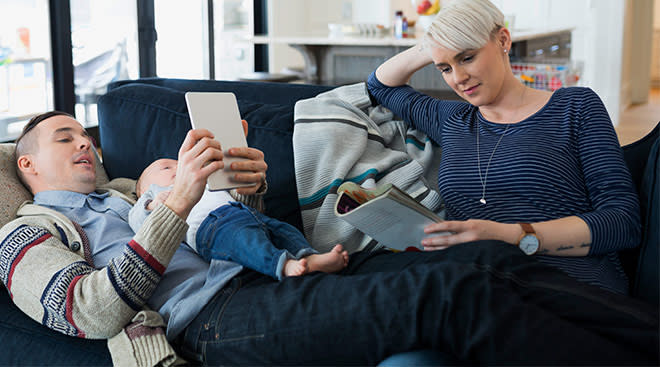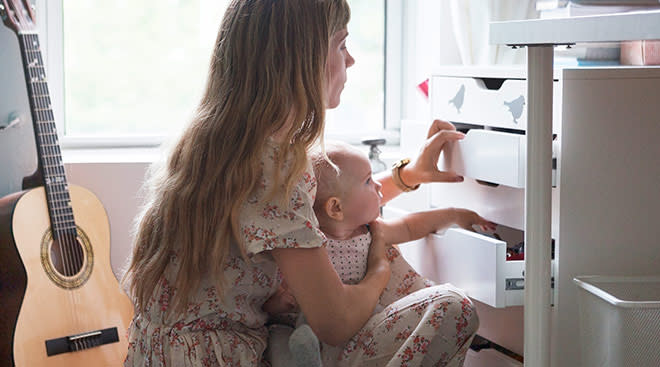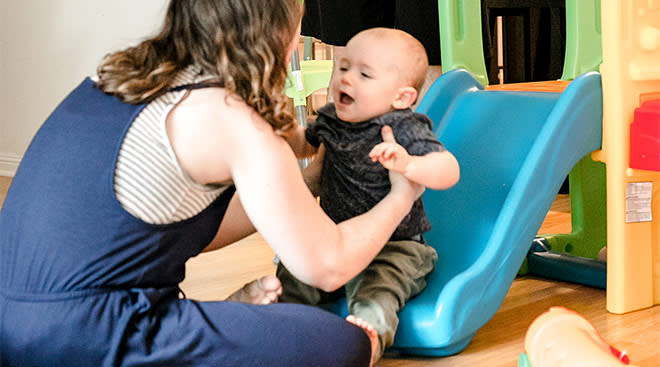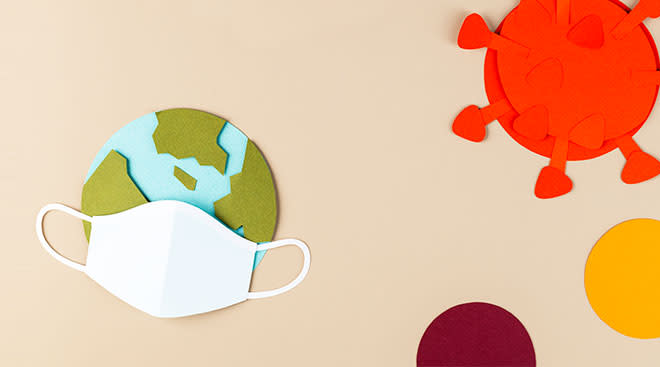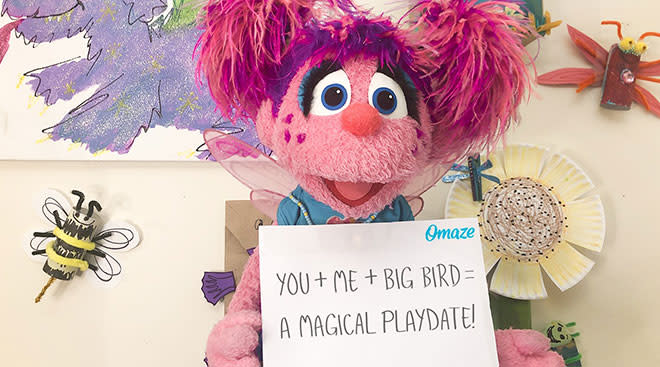How to Balance the Emotional Labor of Parenting in a Pandemic
Something was clearly burning.
“Did you take the Bagel Bites out?” I called out to my husband from my desk. I went into the kitchen, opened the oven and saw that the cheese had turned from creamy yellow to the color of rust.
“Oh, I forgot,” he said.
The kids had “extra-toasty mini-pizzas” for lunch as I went back to typing this story, peeved.
Oh, the irony. Here I was, researching the concept of “emotional labor” and simultaneously dealing with it IRL. I had just finished reading a study that found at least 7 in 10 women feel responsible for maintaining their family’s routines and standards. Thinking about Bagel Bites as I browsed scholarly articles on “mother’s mental burden” was annoying, but not as aggravating as the fact that my mind rarely shuts down completely when it comes to thoughts about the well-being of my children or my seemingly endless list of chores. This feeling is nothing new for women. A 49-page compilation of online Mommy Group threads on the topic proves the idea of emotional labor has been around for years.
So what is emotional labor, really, why should we be especially attune to it during these times of pandemic, and what can parents do to balance the load? Read on.
So what is emotional labor, exactly? Some call it the invisible load or the mental burden of motherhood—you probably know it as tracking everyone’s schedules, remembering to stock up on diapers, figuring out how to wean baby off bottles and wrangling your own day-to-day anxieties.
With coronavirus infiltrating every aspect of our life these days, people’s emotional load is rife with pandemic-induced demons. A March 2020 survey from the Pew Research Center showed that almost half of Americans say their personal life has drastically changed due to the outbreak. The psychological distress, especially for parents with young kids, is significant. The survey also found that child care responsibilities have been “somewhat” or “very difficult” for more than a third of parents—in particular for women, 42 percent of whom said they were feeling the struggle.
And it’s not just addressing kids’ daily needs and tending to their cries and boo-boos. “The notion of invisible labor is not just responding when a child conveys stress—it’s also being watchful for signs that may reflect distress that they may not talk about,” says Suniya Luthar, PhD, a professor emerita at Columbia University’s Teachers College and chief research officer at Authentic Connections, an organization that focuses resilience among students and their caregivers. “Parents are holding on to the pain of their children in addition to their own pain.”
Households that adhere to traditional gender roles may find this time even more difficult. In the face of quarantine, women may be putting even more effort into domestic tasks and maintaining some semblance of peace and stability. On the other hand, men may be feeling more vulnerable as they adjust to their new job of staying home full time.
“This situation is much more stressful for traditional masculine roles,” says Auguste Harrington, a PhD student in social psychology at the University of Auckland, who just published a study on masculine gender role stress and power in the journal Psychology of Men & Masculinities. “The activities that framed their identity previously may no longer be available.”
Unsurprisingly, when mom runs the household—delegating, making the bulk of decisions—she is often seen as the boss by her kids. This can cause some resentment under the new lockdown circumstances. A 2016 Pew Research survey showed that about one-third of fathers say their spouse takes on more chore responsibilities, compared with just 4 percent of moms who say the father does more.
In the age of coronavirus, seeking silver linings is as crucial as washing hands. “This is a real opportunity for a chance to reset the roles in a household,” says Daphne de Marneffe, PhD, a couples therapist and author of Maternal Desire: On Children, Love and the Inner Life. “Two parents at home with kids can create new possibilities and not default to mom or dad jobs.”
Here, we delve into seven ways you and your partner can tackle the emotional rollercoaster of this pandemic and help you stay a strong and mentally healthy family.
1. Work Together as a Team
You already know this—working as a team reaps rewards. Parents are overwhelmed with the enormous amount of anxiety, grief and financial and political uncertainty, so when your toddler throws a tantrum over broccoli, knowing that you have each other’s back can make a huge difference in how you manage emotional labor during quarantine.
Each parent should think of themselves as a remote-controlled car. Charge it too much, and it blows a fuse; neglect to change the batteries and it wanes to a stop. Find the balance of when to plow ahead and when to ask for help.
Don’t be afraid to talk about your worries with your partner or even your kids (at an age-appropriate level, of course) so you can set an example for sharing concerns, even if you’re not necessarily looking for a solution. “This is how people help each other in the midst of horrendous uncertainty,” says Luthar. “Just sharing what you feel with someone who loves you can bring comfort. Resilience rests fundamentally on relationships. If we are going to get through this, we have to focus on nurturing and protecting those close, authentic relationships.”
2. Acknowledge That This Is Hard
Parenting and relationship habits have changed drastically in the last couple of months. The niceties and comforting routines have been swapped by judgment and chaos. “Because everyone is cooped up in the house together, it’s going to be more difficult for one partner to stay removed from taking care of children’s emotional needs," says Luthar. "Literally, you can’t get away from them.”
The thing to remember is that it’s no one’s fault we’re stuck at home. You didn’t unleash the coronavirus and your partner didn’t mandate the stay-at-home order. Under the best circumstances, rearing young children is challenging—long gone are the pre-baby days of sleeping until brunch and uninterrupted conversation. Now is not the time to scrutinize your relationship under the microscope and put more pressure on yourself, says de Marneffe.
3. Reset Priorities
It’s time to draw up a new game plan—especially if you feel that your partner is not contributing as you’d like. Take dinner, for instance. One survey showed that moms spend 45 minutes more on preparing dinner than dads. That may be just fine if you find joy in cooking, but if you feel short-changed when you cook coq au vin and get chicken nuggets when it’s his turn, you need to have a serious conversation.
Yes, your new schedule should have time slots for your and your partner’s work, intermingled with child care and homeschooling activities. But make sure to also block out time for self-care routines (think: a solo run) and social events (perhaps a virtual Happy Hour with your playgroup). “Get it all out on the table and divvy it up,” says de Marneffe.
4. Take a Time Out
Anyone with a toddler knows the perks of a TO—it helps the child calm down in a safe space. When you start feeling vulnerable or on the brink of lashing out, consider putting yourself in a time out. One of the major side-effects of the COVID-19 crisis is the sense that we have little control over the situation, which can be a huge trigger. “Aggression is a behavior that can restore feelings of power,” says Harrington, “but it doesn’t really restore power.”
Consider where the stress is coming from, Harrington continues. Does it stem from expectations you’re holding yourself to? How important are these expectations in this situation? If you’re doing all you can to support your family, cut yourself some slack. The most important thing you can provide for your family is a happy, safe and loving environment, and that starts with you first, he says.
5. Tend to Yourself
Chances are, you may be feeling extra anxious these days. A survey found that nearly 1 in 5 American adults have had a physical reaction (sweating, trouble breathing, nausea, pounding heart) at least some of a little of the time when thinking about the outbreak. “No parent can really say it will all be alright because they just don’t know,” adds Luthar. “It’s scary for everybody.”
The feeling of scarcity—whether it’s the dearth of toilet paper, personal time or financial stress—has become ubiquitous. Either way, this inability to fulfill a need causes additional angst. One way to approach this stress is as you would a new baby: Build up your resilience and get as much sleep as you can. (De Marneffe recommends adding 2.5 hours of sleep daily. Spend what would normally be commuting and school drop-off time tucked between the sheets!)
Consider which personal needs have been sacrificed during this crisis. Make a list and fulfill at least one need each day. It can be as simple as drinking your morning coffee alone on the patio or tossing in a rose-scented shower bomb as you rinse off before bed. “Prioritize self-care,” suggests de Marneffe. “You don’t have the ability to help others if you can’t help yourself first.”
If at some point you notice that you’re slipping further down the anxiety and depression spiral (especially if you have a new baby, as it can make you more susceptible to postpartum depression), reach out to a professional. Your primary care physician or ob-gyn is there to help you. Postpartum Support International and the Substance Abuse and Mental Health Services Administration offer helplines and resources. De Marneffe also suggests Psychology Today’s Therapist Finder for a local resource.
6. Carve Out Alone Time
“I just need a minute by myself,” you likely say once a day. But do you act on it? “Give yourself permission to be alone,” says de Marneffe. “It’s not a rejection or a personal offense to anyone.” Solitude is a way to reconstitute. With kids underfoot, couples are bombarded with mounds of stimuli. All. The. Time. It makes sense that irritability becomes as natural as breathing. Walking in on your partner sprawled out on the couch can cause hair-raising anger if you just dealt with yet another load of laundry. Conversely, he might be annoyed that you’re snuggled up with a book as he mows the lawn.
Stop obsessing about every free minute and block “me time” into your schedule. Make it known that when you go for a run in the morning, your partner will prepare breakfast. But then you’re in charge of bedtime while he cycles around your neighborhood. “To be happy together, it’s important to be apart,” concludes de Marneffe.
7. Circle Back and Repair
The coronavirus is making everyone cranky. When people get down on themselves, they can be unpleasant to be around. Recognize when you’re feeling irritable and own up to it. When you notice a certain behavior, try to identify what is causing it. This will stabilize your demeanor and keep it from escalating.
“None of us are at our best right now,” says de Marneffe. “Be ready with ‘I’m sorry’ or a nice comment of appreciation. It’s worth the weight in gold in terms of oiling the machine of good feeling.”
Telling your partner that you’re grateful for this or that is the glue that will hold you two together during the pandemic, and beyond. If you’re on the reciprocating end of your partner’s foul mood, try to see where he’s coming from instead of retorting right away. “This will only take you into a cycle of reactivity that leads to more conflict,” says Harrington. “When you hear a snap, you think it has something to do with you. Often it’s not just about you; there are other contexts at play.”
Think of your emotional supply as you would about your pantry—I only have what I have today, now what can I make with it? Just as foraging through the top shelf can lead to a new kind of cookie, foraging through your emotions can lead to a pleasant surprise.
About the experts:
Suniya Luthar, PhD, is co-founder and chief research officer at Authentic Connections, an organization that focuses on resilience among students and their caregivers. She also serves as a professor emerita at Columbia University’s Teachers College. Luthar earned her PhD in developmental and clinical psychology from Yale University and went on to serve on the faculty in the department of psychiatry as well as the Child Study Center at Yale. She has also worked as a professor of psychology at Arizona State University.
Auguste Harrington is a published PhD student in social psychology at the University of Auckland. His research focuses on how masculinity and gender roles influence functioning within close, intimate relationships.
Daphne de Marneffe, PhD, is a licensed clinical psychologist in Corte Madera, California, with more than 30 years of experience working with individuals and couples. She is also the author of Maternal Desire: On Children, Love and the Inner Life. She earned her PhD in clinical psychology at UC Berkeley.
Please note: The Bump and the materials and information it contains are not intended to, and do not constitute, medical or other health advice or diagnosis and should not be used as such. You should always consult with a qualified physician or health professional about your specific circumstances.
Plus, more from The Bump:
Navigate forward to interact with the calendar and select a date. Press the question mark key to get the keyboard shortcuts for changing dates.
































